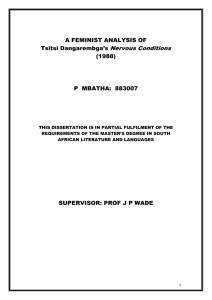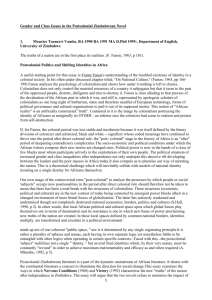Men In Nervous Conditions - Grand Valley State University
advertisement
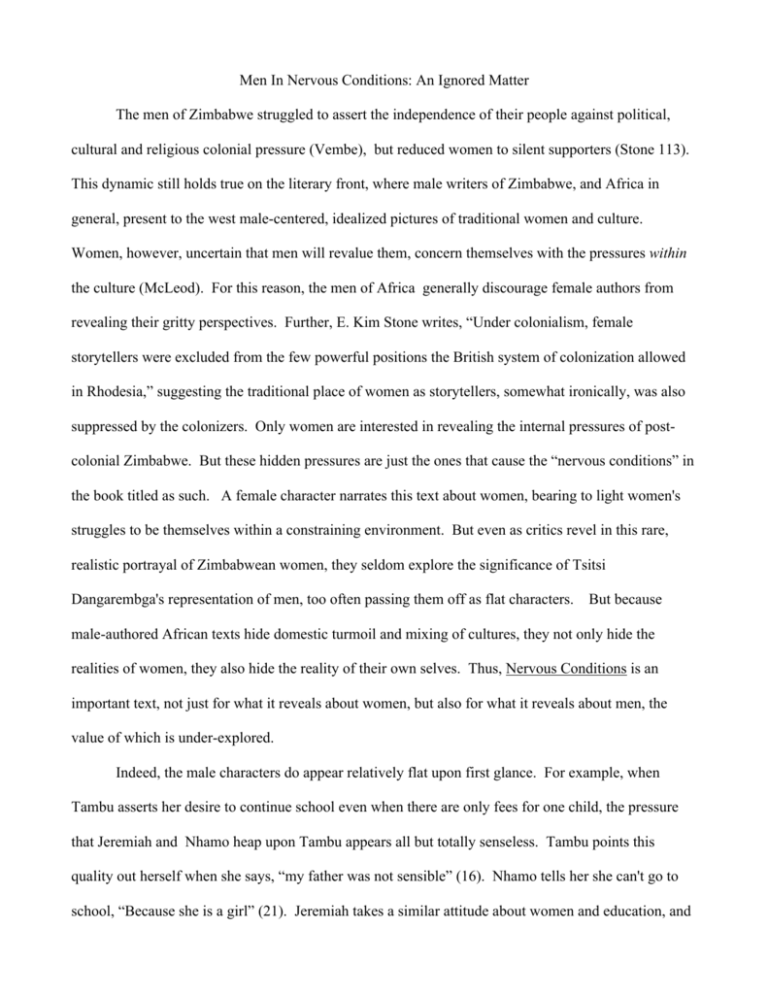
Men In Nervous Conditions: An Ignored Matter
The men of Zimbabwe struggled to assert the independence of their people against political,
cultural and religious colonial pressure (Vembe), but reduced women to silent supporters (Stone 113).
This dynamic still holds true on the literary front, where male writers of Zimbabwe, and Africa in
general, present to the west male-centered, idealized pictures of traditional women and culture.
Women, however, uncertain that men will revalue them, concern themselves with the pressures within
the culture (McLeod). For this reason, the men of Africa generally discourage female authors from
revealing their gritty perspectives. Further, E. Kim Stone writes, “Under colonialism, female
storytellers were excluded from the few powerful positions the British system of colonization allowed
in Rhodesia,” suggesting the traditional place of women as storytellers, somewhat ironically, was also
suppressed by the colonizers. Only women are interested in revealing the internal pressures of postcolonial Zimbabwe. But these hidden pressures are just the ones that cause the “nervous conditions” in
the book titled as such. A female character narrates this text about women, bearing to light women's
struggles to be themselves within a constraining environment. But even as critics revel in this rare,
realistic portrayal of Zimbabwean women, they seldom explore the significance of Tsitsi
Dangarembga's representation of men, too often passing them off as flat characters.
But because
male-authored African texts hide domestic turmoil and mixing of cultures, they not only hide the
realities of women, they also hide the reality of their own selves. Thus, Nervous Conditions is an
important text, not just for what it reveals about women, but also for what it reveals about men, the
value of which is under-explored.
Indeed, the male characters do appear relatively flat upon first glance. For example, when
Tambu asserts her desire to continue school even when there are only fees for one child, the pressure
that Jeremiah and Nhamo heap upon Tambu appears all but totally senseless. Tambu points this
quality out herself when she says, “my father was not sensible” (16). Nhamo tells her she can't go to
school, “Because she is a girl” (21). Jeremiah takes a similar attitude about women and education, and
even after Tambu earns money to pay her own fees, her father audaciously attempts to claim the money
back from the school for himself (30). Babamakuru also presents walls to the women around him,
especially Nyasha and Maiguru, but the reasons for the behavior of this significant character are not
readily clear. Even the explanation for why he is so insistent that Tambu's parents marry (to remove an
evil spirit) is largely incomplete (146). Again, the author presents hints as to why the men behave and
believe the way they do, as explained later in this essay, but she does not fully or openly shape the male
characters and their opposition to female aspiration.
As for the female characters, especially Tambu and Nayasha, however, Dangarembga employs
several techniques to present their complexities to the reader. Firstly, the narrator provides detailed
accounts of the dialogue and actions of the females, even including letters, like Nyasha's, in which she
explains how the males see her as having a superior attitude because she does not believe she is inferior
to men (196). In this way, the author provides room in the text for Nyasha to explain the depth of the
dilemma: she does not feel that she belongs, she does not want to complain or antagonize and,
ultimately, she expresses that being herself is a battle. Further, the thoughts of Tambu (both those
representative of who she was at the time of the narration and those that appear as narrator retrospect)
delve deeply into the lives and perspectives of the women, the men being reduced to topic points in the
lives of females. Comments like, “The self I expected to find on the mission would take some time to
appear,” prolific throughout the text, analyze the phases and intricacies of Tambu's development (85).
Tambu also thinks deeply about Nyasha, having to open her mind beyond reason to even understand
her (96). The author uses these methods and moments to texture the text and bring the reader close to
the female characters.
Dangarembga also enlightens the reader about the other women in the text. Tambu's mother,
who seems to half take on the male mentality by preparing Tambu for failure when she grows the
mealies, also encourages her to try. She even helps dissuade Jeremiah's resistance to the idea (24).
And, though she may seem hysterical and illogical when she claims Maiguru killed Nhamo, thus
protesting Tambu's move to the mission, the mother's dialogue later in the text opens whole new depths
to her character.
She makes statements such as, “Maiguru has turned you against me with her money
and her white ways” (140). Killing, then, as it applies to Nhamo, might be reread as a metaphor for the
mother's view of the effect of colonization on the Shona people. And again, Tambu's thoughts come
into play as a means of analyzing every women in the text, at times even discoursing at length about
Shona women in general (138). Dangarembga never leaves the women of Nervous Conditions beyond
the scope—perhaps microscope—of the reader.
As clear as the female characters are, the complexities of the male figures are understandably
less developed. The value of the text purely as literature withstanding, Nervous Conditions is a
response to the post-colonial literary environment of Zimbabwe. The country's literary world resounds
with the male voice but stifles the voices of women, Nervous Conditions representative of a trend as of
late to reverse this imbalance (Uwakweh). According to Dieter Riemejnschneider, typical male
Zimbabwean literature emphasizes “traditional or conventional images of the African woman” (qtd. in
Uwakweh), not only by including in their narratives female characters who portray those images but
also harsh consequences for rebellious female characters. Nervous Conditions, then, is a weight on the
female side of Zimbabwe's literary balance; without this type of female focused literature, the male
voice would go unchallenged, unchecked and the west would never know the true identities of postcolonial Shona women.
However, despite that male authored narratives of Zimbabwe idealize women as generic forms
(Uwakweh), and though Dangarembga does the opposite by writing from the female perspective, the
author also counters male idealization of women by portraying male characters realistically. Caroline
Rooney reports that even though women helped further Zimbabwe's struggle for independence from
Britain, males generally viewed women just as they always had (qtd. in Uwakweh). Both male writers
and readers lack consideration and recognition of Zimbabwean females. However, by at least
acknowledging the forces in the lives of the men, primarily British colonialism and the remnants of
Shona culture, and by portraying the men as subjects of multifaceted female commentary,
Dangarembga one ups her male contemporaries by presenting more realistic male literary characters, as
opposed to the males' dimensionless literary renditions of females.
For instance, Dangarembga, through the short lived character Nhamo, subtly reveals upbringing
as one of the first insights into the formative pressures in the male world of Nervous Conditions. When
Babamakuru leaves for England and the school fees dry up, Nhamo's parents show their values.
Ma'Shingayi sells vegetables to send Nhamo to school but explains to Tambu that women must be the
ones to make sacrifices (16). By doing this, the mother demonstrates that she submits to the male
mentality of her husband Jeremiah, who asks Tambu if she can cook books for her husband (15). Is
there any surprise then, when Nhamo, even at a tender age, asserts his maleness over his sisters by
making them carry his things home from the bus station (10)? Not only are his father's words and
actions manifestations of a limited view of women, but at this point in the narrative his mother does not
question that limited view and thereby validates Nhamo's assumption that his father's ways are correct.
Nhamo has a condescending, harsh attitude toward women, but it is an attitude he learns from his father
and mother. The men and women of Nervous Conditions learned their gender roles as innocent
children, like Nhamo, without any clear fault of their own and under pressure to uphold those roles.
The differences between Babamakuru and the other Shona men further demonstrate the effect of
upbringing, not only on how eventual adults view the opposite gender, but on entire world-views.
While preparing Tambu for her move to the mission, Babamakuru extols education as part of being a
good women (88). While Jeramiah, who previously resisted Tambu's education, accepts Babamakuru's
plans for his daughter, clearly motivated by submission to his godlike brother, not his own sensibilities
about women and education. Babamakuru further sets himself apart by insisting that a wedding will
restore the morality of the family, a white assessment of the issue. Jeremiah, again, submits to his
brother's plan over his own Shona solution of calling in witchdoctors (146-7). Something is different
about Babamakuru, but his present relationship with the whites is only a limited explanation for the
difference. Though the family arch-patriarch must have grown up with some of the same influences as
his ancestors, he was a child when he left home to be educated and raised by western missionaries (5).
The long running influence of the whites on Babamakuru, from his childhood and straight through
adulthood, is the clearest and most plausible answer for why the choices he makes are so different than
other men in his family.
Cultural mixing is another force in the male world, revealed through Dangarembga's text. Even
while Babamakuru is a carrier of white ideals, he is also a post-colonial Shona man, a patriarch who
has lost sight of the traditional value of women, but retains high expectations. Babamakuru declares to
Nayasha, perhaps to the whole family, that, “We cannot have two men in the house” (115). His
assertion goes for Maiguru as well, who is educated and productive, like him, but does not share in his
authority or glory. Ironically, though Babamakuru insists both Nyasha and Maiguru get good
educations, he stifles their attempts to think and achieve. This irony, possibly representative of an
immature metissage between the white and Shona cultures, provides dimension to this literary character
and insight into the real men Babamakuru represents.
Additionally, Babamakuru, with all his contradictions and peculiarities, represents a diversity
among Shona men unlike the homogeneity among women in male authored African literature. As
inferred from previous examples in this essay, Babamakuru and other men, like Jeremiah and Takesure,
have both commonalities and differences in their concepts of women and morality. For instance, the
importance Babamakuru places on monogamy within marriage, as opposed to Takesure, who goes after
Lucia any way he can, and unlike Jeremiah, who hopes to take her as a second wife. But Jeremiah and
Takesure follow Babamakuru despite their differences and opposing desires, demonstrating a sort of
pressure system between the followers and their leader. Furthermore, this pressure system spans out
into all aspects of life, as demonstrated when Babamakuru motivates Jeremiah to fix a roof that he was
capable of fixing long ago, thus depicting Jeremiah as an apathetic follower, without the hope and
vision of Babamakuru. Though Dangarembga does not focus on men, she still manages to paint a
dynamic, diverse picture of men, while the limited scope of women included in male narratives plainly
and generally indicates two types of women: good and bad.
Perhaps more than anything else, however, the reader learns about the men of Nervous
Conditions from the same sources as the reader learns about the women: female thought and discourse.
Firstly, the mere fact that the women think and talk about the men is significant. In Chinua Achebe's
Things Fall Apart, a woman leaves her husband and sneaks into Okonkwo's hut. The narrator
comments that Okonkwo does the smart thing when he immediately has sex with her, apparently
lowering the chances that he would lose his new possession. However, neither Okonkwo nor the
narrator ever delves into the depths of the woman's plight. According to Professor McLeod, the
supposed reality of the male in colonized countries of Africa, whether it be Zimbabwe or, in the case of
Achebe, Nigeria, is that they are taking the initiative to resist the social destruction wrought by
colonizers, women being practical stepping stones. But as the men excuse their neglect of women by
proposing that they will recover the rightful positions of women when the enemy is set at bay, the men
have lost touch with the humanity of the women around them, as inadvertently represented in male
African literature (Stone 113). Nervous Conditions, itself, points to this male attitude toward women,
most pointedly in Babamakuru's neglect to honor his wife for her equal education level and her
contribution to the household finances. However, in Nervous Conditions, not only do the men get
chances to speak, the women expend a great deal of energy mulling them over, whether it be Lucia
about Takesure, Ma'Shingayi about Jeremiah, or, most significantly, Maiguru, Tambu or Nyasha about
Babamakuru. Merely by including female consideration of men in her text as more than things,
Dangarembga, again, demonstrates a more humane significance of the opposite sex than her male
contemporaries.
Granted, the intimate conversations and contemplations of the women reveal more about
themselves than about the men, as is natural to the most probable social and political authorial motives,
and as may simply be natural in a female written text. However, the personal female discourses in the
text, if read carefully, are also a portal into the complexities of the men, especially Babamakuru. For
example, Tambu's extensive reflections about this man are key to understanding her personal struggle
to find a way between the social atmospheres of the homestead and the mission, but they also reveal the
depth of the Babamakuru character. Through most of Dangarembga's narrative, Tambu looks up to
Babamakuru as a sort of savior or god, and while this may not be a balanced view, Babamakuru does,
indeed, work hard in his devotion to bettering the extended family. Midway through the text, however,
Tambu's opposing sympathies for Babamakuru and Nyasha perplex her until, when Babamakuru beats
Nyasha, she finally makes a firm connection between Babamakuru and the “universal” sexism she had
previously been victim of at the hands of her brother Nhamo (115). Finally, even while Babamakuru
becomes an “ogre” in Tambu's mind (170), the narrator presents yet another view of Babamakuru after
Maiguru had left home and come back (173). In a scene markedly less internal to Tambu, for example,
Babamakuru asks Maiguru if she has anything to say about the decision to send Tambu to the convent.
His first reaction is to stifle Maiguru when she replies that she, indeed, has something to say, but, then,
Babamakuru recovers himself and says, “Speak freely, Mai. Say whatever you are thinking,” visibly
forcing himself to submit to a sort of mixed sex dare (180-81). In the latter portions of the narration
the unilateral force of Babamakuru begins to break down, so that he, like the women around him,
becomes a compromiser and balancer of forces as well. While the reader's view of Babamakuru does
not have an exactly parallel relationship with the changes in Tambu's view of the man, Tambu's
maturing understanding of Babamakuru is a means by which Dangarembga develops a panoramic view
of Babamakuru, deepening him as a literary character.
Finally, an overview of the text paints, among other things, the picture of a black man seeking
the help of white women—the picture of a patriarch urgently pressing to save an extended family and
uphold a mix of often contradicting values, but who fails either to gain control or succeed. Several
times, Tambu notes the rising stress level of Babamakuru (189). Of course, he is working hard at the
school, but not just for his family. As a black man, Babamakuru has no room for error; the nuns could
close the doors they opened for him. He, himself, is pressed to conform to their wishes and
expectations, so, in turn, Babamakuru not only presses down upon the women because he is bigoted,
but in reaction to the pressure on him. And yet, when he says to Nyasha, “You will eat that food,” he is
unable to hold it in her stomach (189). Neither is he able to keep Maiguru from finally defying him by
leaving, nor can he force Tambu to be a flower girl in the wedding he plans for her parents. “Anyone
who defies my authority is an evil thing in this house, bent on destroying what I have made,” says
Babamakuru, but he only frustrates himself by his own decree (167). Eventually Babamakuru is so
disturbed by the fruit of his own behavior that he can hardly stand to be in his own home, staying out at
work for long hours. Babamakuru is a man lost to his own devices, relying on a broken means to
success and ultimately baffled at his failure to have a happy, functional home. Overcome with his own
nervous condition, he is just as trapped and lonely as the women around him.
However, the revelation of the post-colonial Zimbabwean woman is arguably the most
significant achievement of Nervous Conditions, especially in the context of real-life domestic
dysfunction, so it is not surprising that most critics take this angle in their discourses. Nevertheless,
since Zimbabwean authors are also cautions to represent men as ineffectual, Dangarembga's thoughtful
portrayal of men is also rare, and generally neglected as a topic among critics. For instance Maggi
Phillips is one of many critics to delve into the functions of food in Nervous Conditions, indicating that
Tambu achieves success through food and analyzing Nyasha's refusal to take in food while she gorges
on knowledge. However, the relation of Jeremiah to Tambu's mealies, and, more importantly,
Babamakuru's food relationship with Nyasha go virtually unexplored. And Carolyn Martin Shaw
discusses sexuality as the “seat of women's honor” in the context of the father-daughter relationship of
Babamakuru and Nyasha. However, when Shaw makes the claim that “sexuality is crucial to the
understanding of Nyasha's breakdown” she focuses her discourse almost entirely on the daughter half
of the relationship, without regard for Babamakuru as a father or as an individual, merely earmarking
him as a function in Nyasha's life. However, in Pauline Ada Uwakweh's article “Debunking
Patriarchy,” she writes, “Whereas radical feminists emphasize the tensions between male dominance
and female rebellion, traditional socialist feminists emphasize the dialectics of gender, class and race.”
Phillips goes on to examine the many definitions and aspects of patriarchy and proposes that
Dangarembga's “representations of male dominance in the lives of women emphasize its complexity.”
As shown in this essay, Babamakuru is more than an animal who perpetrates patriarchy, but, rather, he
is a human in the midst of a culture clash. Preferring a holistic approach to Nervous Conditions over a
limited view of the text as merely a statement of femininity in the midst of harsh patriarchy opens doors
to discovery about both Zimbabwean women and males, as well as opportunities to delve even further
into the focus of the text: Zimbabwean women.
Dangaremba does more than stand up cardboard cut outs of patriarchs in the midst of animated
female characters; she constructs realistic male figures as integral components of a palpable narrative,
adding underestimated value to the text. Writing in the midst of a male dominated literary environment
bent on hiding internal strife, the author reveals the true plight of women and men, and a dynamic view
of the the post-colonial Shona people. More and more female author's are breaking through to shed
light on the inner workings of the Zimbabwan society; time will tell the impact of their texts, in the still
struggling nation of their origins, and across the breadth of their western audience.
10
Works Cited
Achebe, Chinua. Things Fall Apart. London: Heinemann, 1962.
Dangarembga, Tsitsi. Nervous Conditions. 1988. Emeryville, California: Seal Press, 1989.
McLeod, Dr. Corinna. Personal interview. 18 Nov. 2008.
Phillips, Maggi. “Engaging dreams: Alternative perspectives on Flora Nwapa, Buchi Emecheta, Ama
Ata Aidoo, Bessie Head and Tsitsi Dangarembga's writing.” Research in African Literatures.
25.4 (Winter 1994): 89+.
Shaw, Carolyn Martin. “'You had a daughter, but I am becoming a women': sexuality, feminism and
postcoloniality in Tsitsi Dangarembga's Nervous Conditions and She No Longer Weeps.”
Research In African Literatures. 38.4 (Winter 2007): 7-27. Literature Resource Center. Gale.
Grand Valley State Univ. 23 Oct. 2008 <http://go.galegroup.com/ps/start.do?
p=LitRC&u=lom_gvalleysu>.
Stone, E. Kim. “In the Bedroom: The Formation of Single Women's Performative Space in Tsitsi
Dangarembga's Nervous Conditions.” The Journal of Commonwealth Literature 41.111 (2006).
23 Oct. 2008 <http://jcl.sagepub.com/cgi/content/abstract/41/1/111>.
Uwakweh, Pauline Ada. “Debunking patriarchy: the liberational quality of voicing in Tsitsi
Dangarembga's 'Nervous Conditions.' (New Voices in African Literature).” Research In African
Literatures. 26.1 (Spring 1995): 75+. Literature Resource Center. Gale. Grand Valley State
Univ. 23 Oct. 2008 <http://go.galegroup.com/ps/start.do?p=LitRC&u=lom_gvalleysu>.
Vambe, Lawrence. An Ill-Fated People. London: Heinemann, 1972.
11
Qs for McLeod:
1) footnote to indicate that traditional Shona culture itself may have had a more balanced view of
men and women, but that the current Shona culture is different, due to colonialism and possibly
other factors.
2) Thesis pointers (maybe not force this, like what's his name that we read first in semester)
3) Need male tear down sources
4) good bad citation?
5) “The reader”
6) Shona characterization (move from traditional to current?)
@@@ Cut material:
Perhaps it is the fault of the Shona men and women for not questioning this male centered attitude and
way of living, perhaps not even examining if their ways are authentic to the ways of their Shona
ancestors.
True, the women's discourses about men do reveal more about the women than the men, but the
depth of femal consideration of men, again, shows that Dangarembga's approach to men is more
thoughtful than the approach of her male counterparts to women.
Nervous Conditions stands out in the context of the male written texts of Zimbabwe and other
colonized countries of Africa.
When examined closely, the text's male characters, especially Babakmakuru, are also complex
characters constricted by societal expectations and, perhaps most importantly, the English colonizers, a
more thoughtful approach to the opposite sex than the author's male contemporaries among African
writers. [perhaps rewrite to include solution issue]
Right away, Tsitsi Dangarembga hints that there is conflict between men and women in this story.
Tambu “was not sorry when [her] brother died”; not Nhamo the person, but her brother, a male, like all
the other males who trouble her (1).
{{{{{{
The whole world that Dangarembga creates around Babamakuru. He goes to England for an
education, but only by accepting help as a black Shona man from white western women. Clues from
all over the text help fill in the meaning of the man's choice.
But there is a second strong voice embed into Tambu's narration: another voice that helps the
reader understand and appreciate Babamakuru as a complete character. Babamakuru oppresses Nyasha
more intimately and forcefully than any other female in Nervous Conditions, but, she, herself, reveals
that the pressure her father places on her is, in part, a reaction to pressure on him. This is not the story
that Dangarembga sat down to write, but, nonetheless, Nyasha helps direct the reader's interpretation of
12
Babamakuru's situation when she says, “
106 promising black boys, grateful acceptance, also Baba disagrees with white ways, 107 it was
thought that good blacks bred good black children
Summary of Baba: is nervous, has to be a good black man or will be sent back to nothing—are there
female counterparts to Baba in male narratives (source to back up)
}}}}}}}
(step toward understanding NC as a holistic view of post-colonial Shona culture) Nervous
Conditions fills a literary void among male focused literature, not only by portraying the female
perspective, but in as much as it realizes that female view holistically within the complete reality of
both sexes.
tranny to nun pressure segment by talking about Ny's sympathy for Babamakuru
Besides extrapolations and such female's lives are a source of understanding the complexities of the
males, such as sympathy for B and Nun relationship. Important to review these issues so that we we
not view Titsi's effort as a reciprocal of the supposed shorsightedness of male-centered
narratives.
[include another paragraph on colonization after part about gleaning depth of men from female
discourse]
Baba always uptight, under pressure (Baba's own nervous condition)
to challenge the men
Whites p 6
[relationships cut—where did real Shona culture go]
Show how completed view of men and completed view of women interplay to form a whole picture.
conclusion.: NC completes the picture of both Shona women AND men, whereas male texts are not
totally successful in either case. completes picture previously unseen; while it may be obvious that NC
reveals the hidden complexities of women, it also reveals the man b/c without seeing how the men
affect the women (as in other books) we do not understand the men.
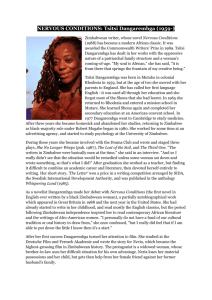
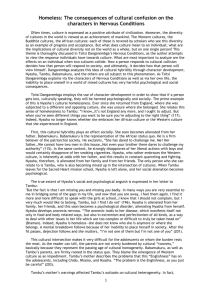
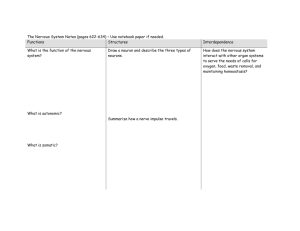


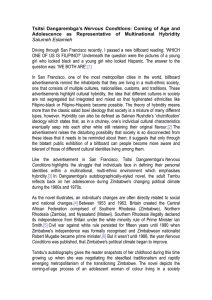
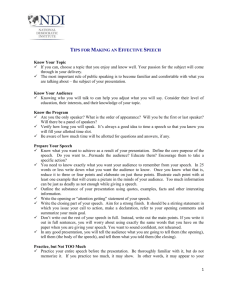
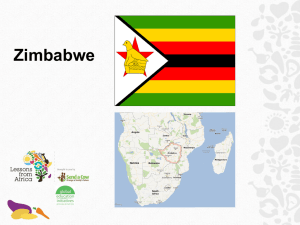
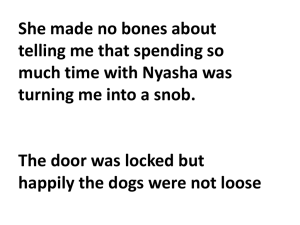
!["This Englishness Will Kill You": Colonial[ist]](http://s3.studylib.net/store/data/009169594_1-0b2f76b0905627292abf2f4e7cecd98f-300x300.png)
